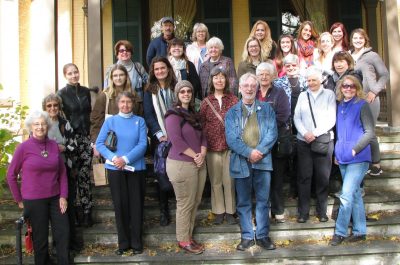Project Showcase: Seward Family Digital Archive Community Project Achievement
20 December 2017 – Carrie Knight

Seward Family Digital Archive staff and volunteers at the Seward House, Auburn, NY, Fall 2017. Photo credit: Carrie Knight.
Since 2012, the Seward Family Digital Archive Project, under the aegis of the University of Rochester’s Rare Books, Special Collections, and Preservation Department, has endeavored to digitize portions of one of its most utilized collections—the papers of former U.S. Secretary of State and New York governor William H. Seward. In 2014, the project decided to broaden its scope to include volunteer engagement as one of its central goals. This decision has dramatically re-shaped the project, in both form and purpose.
The papers of Seward (1801-1872) came to the University of Rochester in 1951. Glyndon Van Deusen, who taught at the university from 1930-1962, wrote about the collection arriving in “trunks, boxes, and valises, some bound up in bundles, all covered with the dust of decades.” The choice to focus digitization efforts on family letters, rather than the material focused on politics, has allowed the project to shed new light on Seward’s rise to national prominence within the context of personal relationships he maintained throughout his life.
Students engaged in the project have designed and built a website and created databases for persons mentioned in the letters (about 4,000 thus far), places, and literature (upwards of 5,000 titles to date). The project also opens a rare window onto family life in nineteenth-century New York, expanding opportunities for research and scholarship.
Community outreach has been a priority for the project from its inception. When Michael Read, a graduate student at University of Rochester, delivered a lecture before area senior citizens describing the early stages of the project, he did not anticipate the level of interest it would generate. Project leaders, inspired by the response, identified a valuable connection between the needs of the project—accurate transcription of nineteenth-century handwriting—and the skills of the senior community for which reading antique handwriting came more easily than among younger readers.
Supported by grant funding from the Emerson Foundation and the National Historical Publications and Records Commission, project staff developed a volunteer program within the larger project whereby volunteers would transcribe and annotate historic letters alongside students and staff.
Senior citizens responded enthusiastically, enjoying the lively conversations the work inspired and the delight in discovering new insights about the family through the letters. They encountered challenges along the way: gaining technical proficiency, deciphering unruly handwriting, and learning the subtle “art” of annotation. Yet these were issues project staff had encountered themselves at various points in their own training. Having overcome (or something close to it!) these challenges, project staff were better able to serve the training needs of the senior volunteers, who in turn helped train new volunteers as they joined the project.
This collaboration has created levels of investment that extend beyond the university and beyond the project itself, investments in one another and across the wider community. In the end, this may be the project’s greatest achievement.
For more information about the project or to access the Seward Family Digital Archive, visit www.sewardproject.org. Hear about interesting trivia and project updates by following us on Twitter @sewardfamdigarc.
~Carrie Knight is a Ph.D. student in U.S. history at the University of Rochester and the volunteer manager of the Seward Family Papers Project.




Do you have any clues as to why that site (www.sewardproject.org) seems to be down?
Hopefully, you’re aware that http://www.sewardproject.org is down for some reason?